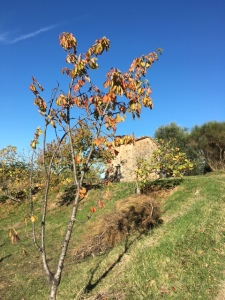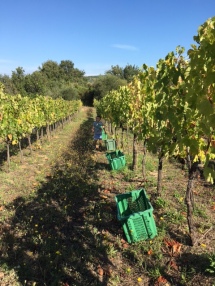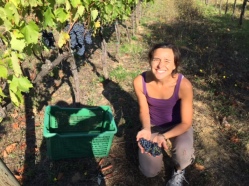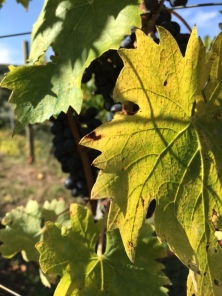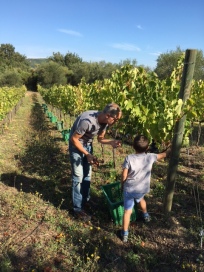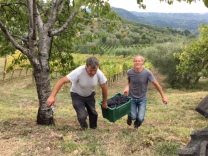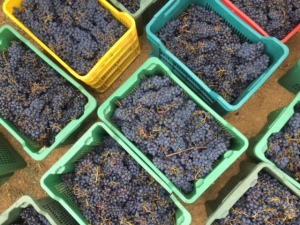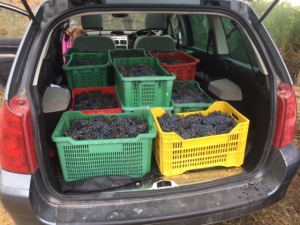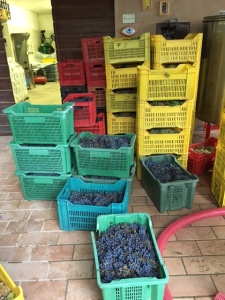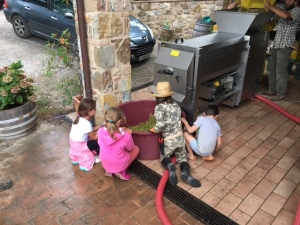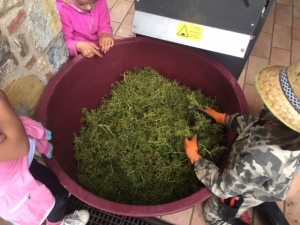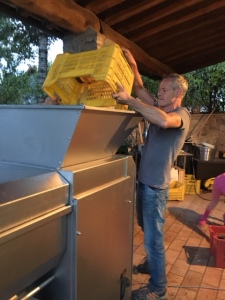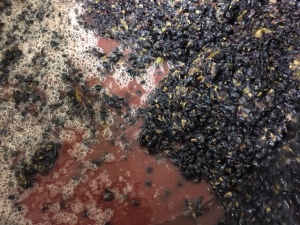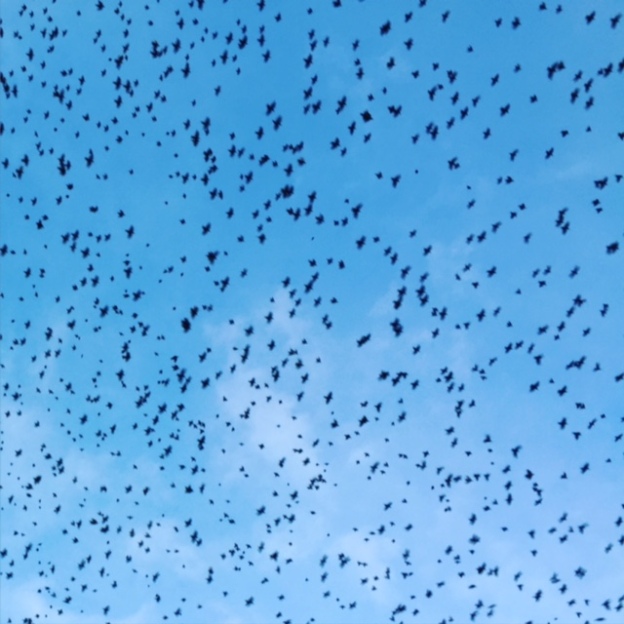

Au Revoir
The second car is packed and our hand baggage with accessories for all eventualities – hunger, boredom, train delays, flight delays, emergency toilet trips – hidden somewhere, though whether I will find the appropriate accessory for occasion remains to be seen.
We’ve been stumbling over boxes for weeks and all grumbled in frustration wondering where something is, whether it is packed, has gone already in the first car or is genuinely missing. The house, this house that we have called home for the last 18 months is finally – immaculate and ready to be handed back to its owners. It’s the only home La Principessa really knows and it’s peculiar to think it is unlikely that, with time, she will remember any of this particular house.
In school today, H and P diligently gathered together astucci (pencils cases), quaderni (exercise books), libri (textbooks), arte and we hauled the sack home, presenting it to Tom to be squeezed into non existent spaces in the car, staving off their excitement to show it all to us right now when time is pressing and we depart at 5.30 tomorrow morning.
The children’s school Christmas festivities have been celebrated and sung amongst smiles and laughter, tears and tantrums, depending on the age and circumstance of the children in question. La Principessa ran up to join her brother and sister in singing a remarkable complement of songs in staccato paced Italian in a celebration which brought together the best of this progressive scuola familiale we have created here.
We leave tomorrow, 15 December, 18 months to the day from our departure which seems aeons ago. These short eighteen months have been full of adventures and new experiences, challenges and trials, soaring zeniths and crashing nadirs. We have shouted, screamed and cried, laughed and sung sometimes all in the space of moments. We’ve been bemused and confused by this insanely frustrating but beautifully welcoming country, we’ve wondered when people haven’t understood us when we’ve tried so hard to be understood and basked in contentment when things have clicked. We’ve questioned just how many forms are required, signatures needed, people involved or opinions sought. We’ve realised the bureaucracy is as bad as everyone says it is. And worse. We’ve bought some land, renovated a stone hut, revelled in our gorgeous spot and realised we have una bella sfida (a great challenge) ahead of us. We have pruned, bud rubbed and worried about mould on vines, watched anxiously for rain, watched even more anxiously as unseasonable hail has battered precisely our corner of the valley. We’ve watched in despair as our precious olive crop fell to the ground weeks early, massacred by the olive fly, but rejoiced in the peace of our plot of land and the hope that next year will be different.
We have learned a language – some of us (the children) with perfect pronunciation, others of us (me) packed full of errors and mispronunciation, on which friends smile benignly. We’ve found ourselves buying cinghiale direct from the hunters’ cellar, after a cryptic coded conversation at the butchers. We’ve collected honey from our friends’ bees, been privileged to help make pecorino cheese, climbed rocks and swam in the wild, watched eagles swoop, deer graze and scarper and full moons rise majestically over the mountain.
I’ve helped my Italian friend to set up a school, been privileged to prototype rapidly ideas that have been bubbling for years. I’ve ‘taught’ in Italian, marvelled at the children’s amazing adaptability, rejoiced in the freedom of a school created for children’s childhood. I’ve met and worked with an inspiring and wonderful group of people, understood and misunderstood, stumbled and tripped when my Italian won’t keep up with my ideas and found myself running finance meetings for the school.
I have gone through the motions in reverse these last few weeks as we have packed up to leave and I feel the same but oh so different; these months are inextricably a part of us and backwards we will understand better how.
For now, we’ve thrown ourselves out of our known and every day we discover something more about the other, the culture, the land and the people here. We are ‘other’ and we observe ‘the other’ and in doing so hold up the mirror to our own nature. We feel more acutely what we are and understand better how hard it is to assimilate. Tomorrow is the end of this chapter but just another step in our relationship with the bella and the brutta of Italia. The book is unfinished; we have sketches of the plot but it’s open to changes. The sadness of leaving is offset not only by the comforts of familiarity awaiting us all but more by the knowledge that the goodbyes we have bid in the last days have been salutations not of farewell but au revoir.
.
Era una casa, molto carina
I wake with the children’s rhyme resounding in the voices of innocence, the simplicity of intonation and of the ditty’s sentiment seem so perfectly attuned at this moment to the earthiness of being here.
There’s a dear little house, standing in the corner of two vineyards and an olive grove. It’s not quite without a roof and has a charmingly basic kitchen. We have yet to work out the issue of bodily functions. But it is our sanctuary, standing, small but perfectly formed, solidly at the foot of the Monte Amiata. Incomplete though it is, it already feels like a bolthole. My sliver of sunshine, actual and metaphorical. My still point in the turning world.
I have escaped there for solitude. Time to think and to be.
The leaves on the fig tree curl in acidic yellow edged with brown, sharp against the gentle grey of the branches. The vines are almost bare, knotted and woody arms edged with gnarled nodes from which shoot russet brown sticks. Here, bleak winter is modulated by memories of the year’s seasons: delicate ever silver green leaves of the olive tree soften the barren season. Late autumn sunshine seeps through the peace of hearing a single fig leaf fall crisply to its counterparts on the ground. These indeed are:
‘Visions flitted Guido
Titian – never told –
Domenichino dropped his pencil –
Paralyzed, with Gold –’*
Paralyzed with Gold. I am in this still point and I am paralyzed by the gold of being here. Paralyzed by endless skies, crisp colbalt blue in the sun and the precision lines these draw in nature. Even with clouds the extraordinary effect of the expanse of sky bestows a light which is inexpressibly arresting. A light which sharpens the landscape into an awe-inspiring intensity.
I am standing rooted in my still point and the apparently infinite wealth of nature is a panorama before me.
But the world is turning and turning…. life seems both so inexhaustible and so precariously finite. I am in this still point.
I can turn from the world’s pain, at this moment so acute and widespread; this is an extraordinary and humbling privilege, felt more profoundly as we move into our last weeks here.
Our little house will stand firmly here, embraced by the mountain, joyously open to the valley. A disparate reality. I stand, absorb and dance with this beauty only to turn to the grey pages of other realities. The streaked faces of the children of Syria juxtapose excruciatingly and pitifully with the children’s song in my head.
I take this moment to fathom my fortune and feel gratitude. I take this moment to fathom my fortune and make small promises to myself, promises to remember these disparate realities, the bella and the brutta of the world, to remember these realities and my good fortune in relation to each, now more than ever in the crushing reality of the world stage as we move into the last days of 2016.
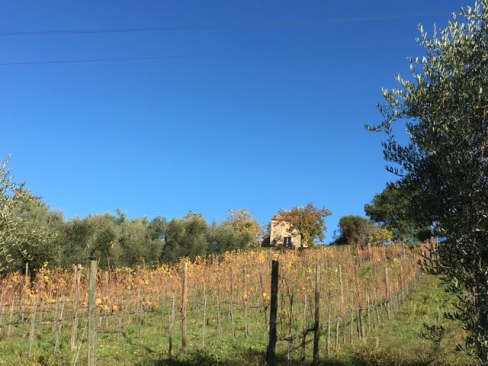
*Emily Dickinson
The Paradox of Choice
‘Mummy, I feel like I am on that wheel at the park in Grosseto. If I run up one side, it’s England and if I run up the other side, it’s Italy. I don’t know which way to go.’
P.’s articulation of this equivocal state captured perfectly our own feelings. November marks the start of the final weeks of packing up before we move back to England.
P. is torn, as we all are, by the paradox of choice that brought us here initially. We created it for ourselves in choosing to step out of who we were and push on the boundaries that we create for ourselves in life. On one side stands England and for H. and P., returning will doubtless bring some relief as they pull on the garbs of familiarity in their daily life: the walk to school, friendships which will be negotiated in mother tongue, the comfort of being close to family, of the consistency of having Tom around regularly, of not having to say goodbye to him on his London weeks.
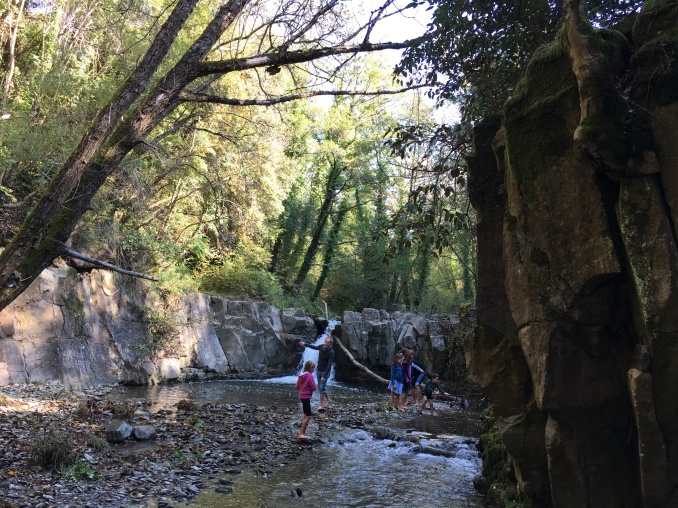
Dam building and wild water in Italy
On the other side stands Italy, the spirit of adventure which brought us here and which has defined our time on the Amiata. An experience in Italy that has pushed our boundaries, as individuals and as a family. Italy that has, paradoxically within its restrictive and potentially infuriating bureaucracy, afforded us extraordinary freedom in countless ways. The paradoxical confusion of P.’s feelings are played out for all of us in our emotions and in our existence here.
Teetering on the poignant cusp between Italy and England I feel this paradox acutely in what this year has offered the children. In leaving England, we left a school system that I felt strangled the very children it was supposed to teach. Despite the best intentions of many teachers who can see the pitfalls of the curriculum, the driving force of English schooling strait-jackets children into rote learning and tests, conforming them out of creativity. We plucked them out of that, held hands and leapt into the dark, in truth knowing very little about what it would be like here. Not knowing and, initially, not understanding, was, on reflection, extraordinarily liberating not only for me, as an educational professional and as a mother, but also for the children. School in our first year in Italy became about the language, and understanding what was going on, rather than about tests, testing, keeping up or racing ahead, in whatever way those featured within the tiny school the children attended. To be within an education system only temporarily affords a very different and potentially liberating perspective.
The unfolding of the school year ran in parallel with our increasing understanding of Italian. With the flowering of language came the understanding that this is an education system that is utterly broken, albeit in very different ways from that in the UK. Information with which I suppose I could have armed myself easily before we came, had I chosen to research. There must have been an instinctive self-correction there: too much knowledge can be a dangerous thing, and too much knowledge would almost certainly have compromised our decision to move here. So we left one education system that, in focusing solely on measuring, testing and results, is losing its way and risks disenfranchising from learning a vast swathe of the next generation, to a system that is beyond ripe for reform both administratively and inside the classroom.
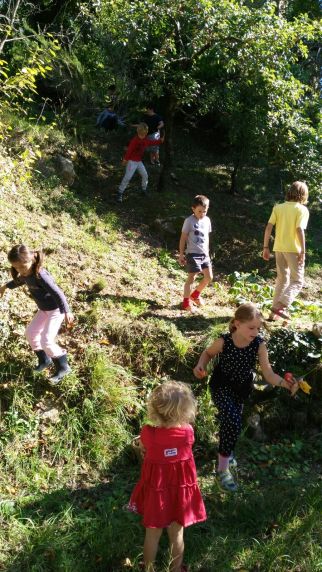
Outdoor learning at Poggio d’Oro
As with almost all things Italian, however, for every broken system, incomprehensible law, unfathomable decision, there is another way, a ‘giro’ or a ‘soluzione Italiana’ if it can be found. The circumvention to those regulations which are less palatable, coupled with an innovation which is actually key to the Italian mindset, are two qualities which meant it was possible for my Italian friend and I to set up our alternative school here in Italy. Thus it is, that, despite the trials of last school year, H. and P. are now enjoying three months in a school that is overwhelmingly joyful. We came from a schooling system that struggled to maintain creativity despite the system, through a state run school here that nominally aspired to teach differently, but was strangled regularly by the bureaucracy for which Italy is renowned, to reach this brief, beautiful, halcyon period. Three months of school that feels wholesome, alive and joyous. Poggio d’Oro (literally, ‘knoll of gold’) does feel golden. Perhaps particularly golden in the poignancy of this moment, as we stand once more on the cusp of change. This golden hillock is giving children their childhood. Freeing them to learn in ways which excite, energise and inspire them.
As I walk up to school for our regular afternoon meeting, I hear the children’s games. One day they have found treasure, beautiful coloured stones and they are deciding as a close knit team of children, where to keep their precious booty. Another day they come running over to tell us that they have found out where the chickens have been laying their eggs, they’ve collected eight and put them inside to be shared out. One afternoon they are tasting the juice they pressed from grapes when they learned about wine making with a local producer – excitedly they tell me it has started to ferment naturally – they are making wine!
On other occasions a friend brings them back from school. They tumble in the door, generally grubby from a day which at some point has been spent outside gathering autumn’s bounty or starting to build their wooden base house or down in the cantina making a town from clay ready to light up at Christmas. Their faces are shiny with excitement – they have made me crotcheted necklaces, they need to buy screws and nails so that they can carry on constructing their base, they made soap out of olive oil and pressed flower leaves in. They are learning songs for Christmas and they had a go at a new martial art. Tomorrow is their beloved Feda who teaches them music. Only two more days til woodwork on Friday.
Capture these moments. Imprint them. Hold them close and fast. The clock ticks and I want to make this a reality in England too. The paradox of choice.
La Nostra Vendemmia 2016
There was no stopping the industrious P. at the land on Saturday. Replicating the vendemmie observed recently, he diligently set the crates out along the vines and grabbed his forbici for cutting.
Tom was still asking me whether we knew the terms of Carlo’s wine offer. Would we get to taste our own wine or were our grapes going into a sfuso mix? Would he store it for us? Would he bottle it for us? For my part, I was relieved that Carlo, to whom I already felt considerable homage, was doing the first stage of the wine making process.
There is a meditative peace to harvesting – or rather to a harvest small enough not to be overwhelming and on which one does not rely for one’s livelihood. Standing low in the field, the children’s voices faded to an incoherent babbling, interspersed with the odd rippling giggle. I wrapped myself in the gentle calls of the birds and the slice of secateurs as I snipped the grappe, my fingers gradually dirtied and roughened from picking off unwanted grapes. The rhythmic repetition of the task, as with all manual labour, is liberating. At one and the same time the mind focuses the hands on the task and yet is free to wander through thoughts, memories, possibilities. In turn and in time, this, our first vendemmia, will become the focus of reminiscence, for all of us.
Later, the clouds draw in and we smell the rain in the air. We have stopped for lunch, the blanket spread under the fig trees, and we hungrily devour Tuscan bread and pecorino, with a drizzle of olive oil and fresh tomatoes.
The children, joined by friends helping us, are filthy, their hands stained with purple grapes and their faces streaked with dirt; they have abandoned the vendemmia now and are digging in a huge pile of unwanted sand. They create a kingdom with underground tunnels, secret passages, a domain for each of them, interconnecting paths. Their play becomes ever more elaborate. They find discarded bricks and pieces of wood to stabilise walls and passageways. Theirs is a private world, it is not ours to enter and nor do I want to. This is how the play of childhood should be: unguided and uncensored, inaccessible to adults and unrestricted by time. I feel a clarity again: this is what this year and this space has offered us. The separation from the pace of life we had. The separation from the need to be, to do, to say, indeed to perform in a certain way at a certain time. I feel more urgently than ever the prodigious need for childhood to be childhood. I feel the incongruity of the choice afforded by modernity juxtaposed with the pressures the same propagates. Gains sit uncomfortably next to losses. The paradox that our choice to come here was facilitated, even made possible only because of, our access to the very modernity we are trying to escape.
The clouds look increasingly ominous. The children, cocooned in their imaginations are impervious to our voices. We leave them to their own creation, their mini-adult world and return to the vines, working with increasing pressure to fill the crates and strip the vines of the grappe before the rain sets in. We stack the crates inside the stone house and the air turns cold with the impending storm and the whole group, children included now, comes together to finish the last fila. The children join forces to haul a crate up the hill and we count them up. Fifteen crates. ‘Poci, pero’ buoni’ says Vincenzo. A small harvest, but a good one. The grapes, it seems, particularly for an amateur, are fine, good, even. Vincenzo drags his boys away from their play, they are stained with sand, inside and out. Dirty children: a direct correlation to a happy day. Adrian helps us load the crates into the cars and our neighbours come up to see how we have done. ‘Congratulazione – la vostra prima vendemmia!’ Harvesting, the coming together of the year and the bringing together of a community.
Carlo’s cantina is in the valley below our land, with a work space inside and the equipment for the first stage set up outside, under the pergola. Crates of white grapes stand waiting as Carlo bustles around with red flexi piping. The welcome is immediate and warm. We are strangers united by this experience and I try to explain how grateful I am. Carlo is a delight: he started making wine ‘quindici anni fa’ (fifteen years ago) with ‘niente’ (nothing). This was new to him, he learned, not from his father, but from scratch. This is his passion. This and snow: wine making in the summer, ski instructing in the winter. A kindred spirit indeed for Tom. He is alive with the excited energy of a school boy about to start a science experiment. He checks the equipment, ‘speriamo’ he says – let’s hope. It should all work, but there is often something ‘impreviso’, something unforeseen. He will press the white first then move onto ours. There is a final check of equipment and several sallies back and forth into the cantina itself.
I love the peculiar conflation of the semi-professional cantina, with the huge stainless steel barrels inside waiting to ferment the wine, and the beautifully make-shift approach, as the red piping needs to be artificially shortened, to which end it is coiled back on itself, snakes round the floor and is then strapped to a pillar, the mouth opening into the waiting barrel.
Finally, the machine is turned on and the first crates of grapes are thrown into the container at one end of this machine. Next to this is a square container, which on closer examination reveals a revolving toothed mechanism. To one side of this is another revolving toothed mechanism, opening into an empty box. From the other side the red corrugated piping leads to the waiting vat.
The machine groans into action and immediately the raspi are spat out into waiting box – the stems are bared of their grapes with remarkable speed. The machine spits them out frenetically and the children soon gather round the crate, collecting stray raspi and tidying them into the box. Tom helps to throw the grapes in at the other end, I am called upon to hold the red piping up – it keeps threatening to break loose and flood the floor with wine, but we catch it just in time.
As the last crate of grapes is loaded in, Carlo turns delightedly to us. ‘Sai cosa abbiamo fatto?’ I love his eagerness to explain and in explaining, to share his passion with us. This first stage separates the ‘raspi’ from the rest of the grapes. Now we have the ‘uve’ with their ‘bucce’ (skins) and the ‘semi’ (pips). These white grapes will be kept in the container with their skins on only over night. The juice will then be drawn out and the grapes pressed again to remove their seeds and skins. Carlo gestures to an old fashioned looking press outside, which will be used for this process. The red grapes, conversely, will be kept in the container with their skins on for approximately 10 to 14 days. Carlo breaks open a red grape to show the clear flesh inside. The only difference between red and white wine is the skin colour. The colour of red wine is achieved through this longer period with the skin on, which also gives the red wine more tannin, the natural compound in grapes responsible for the dry taste in the mouth when drinking wine.
The white wine is finished and there is another flurry of activity as we stand by, waiting for instructions. La Principessa has woken up from her nap in the car, and is ‘in braccia’ now, partly snuggling in for warmth, partly an embrace forced by us to keep her away from the grapes which she is keen to tuck into. ‘Not eat uva, make vino?’ She asks, pouting slightly.
Stretched out to its full length, the red pipe now leads into the cantina, where it hangs over another empty barrel. Carlo explains that he will be harvesting his Sangiovese grapes next week. This barrel is for our grapes. Naturally, he cannot add his grapes to ours next week, to do so would be to ruin the quality of both wines. Tom and I exchange excited glances. The irony of worrying for weeks about the practicality of turning our grapes into wine and now, how we have fallen on our feet, being directed to Carlo at the eleventh hour. Too late to do anything, I nevertheless check with Carlo, ‘Sei sicuro? E vi si imbottigliare anche tu?’ – Are you sure, and you will bottle the wine too? ‘Ma certo!’ – Sure.
Carlo is vibrant with energy, absorbed in the wine making process so when I propose the 50/50 share of wine which is standard here, he shrugs his shoulders: ‘Ma perche? Tranquilla’. Don’t worry – he is happy to make the wine for us. Seeing we are onto our grapes now, H. and P. rush over to help lift the cassette up, hauling the grapes into the barrel. Carlo gestures to la Principessa, offering her a grappa to throw in, making sure we are all part of this wine making process.
And it’s finished. The crates are empty. The uve and bucce separted from their raspi. We all take a look in the barrel at the beginnings of our wine. Carlo is dragging the red piping out of the cantina. So, what next? I ask – we come back in April? ‘Ma non! Venete in due settimane’ to see the drawing off of the juice from the bucce. It is as important to Carlo as it is us that we are part of this process. ‘Ci sentiamo’, he says – we’ll be in touch. It’s raining now as we leave and the lightening forks over Montegiovi. We arrive home, wet and cold, but bubbling with the exhilaration from this day of bounty.
*vendemmia – the grape harvest; the same word is also used for ‘vintage’ as in Vendemmia 2016


